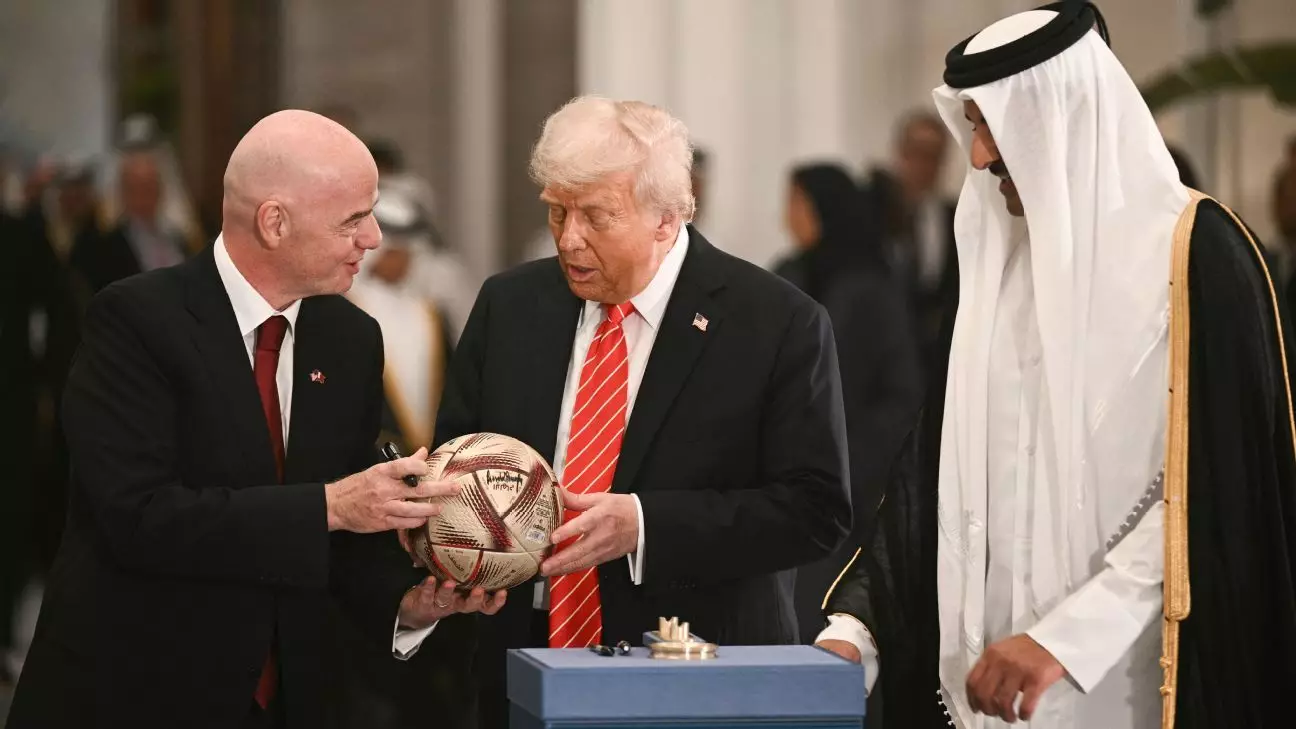In the realm of global sports politics, few events carry the weight and importance of FIFA’s annual gathering of member federations. However, this year’s meeting in Asuncion, Paraguay, was marred by the late arrival of FIFA President Gianni Infantino. His choice to prioritize state visits to the Middle East with U.S. President Donald Trump raises serious questions about his commitment to the universal game of soccer. Arriving on a private Qatari jet after a convoluted route that took him from Doha to Nigeria before landing in Paraguay, Infantino made a statement—not through his words, but through his actions.
Setting a poor example by delaying the gathering meant for 211 nations is a clear miscalculation. It was not simply a matter of inconvenience, but rather an affront to the values FIFA is supposed to represent. The unexpected three-hour delay resulted in key figures, especially from Europe, leaving early, unsure whether their exits were due to prior commitments or a silent protest against Infantino’s tardiness. This inability to honor their schedules reflects a leadership flaw that extends beyond transportation issues—it manifests as a lack of respect for the representatives of international football.
Prioritizing Politics Over Football
Infantino’s justification for the delay revolves around his assertion that his participation in high-stakes political meetings in the Middle East was critical for the sport. His claim that it is “important to represent soccer” in such contexts suggests misplaced priorities. While building relationships with political leaders can be advantageous, it raises a troubling question: Why is he prioritizing these engagements over direct interactions with the very federations that govern the game globally?
Supporters of Infantino might argue that cultivating strong political relationships is vital for advancing the sport and its interests. However, one cannot overlook the symbolic implications of a FIFA president who arrives late to an essential meeting after exchanging pleasantries with heads of state rather than convening with national soccer officials. The core of FIFA’s existence is football, not diplomacy, and Infantino’s choices have blurred those lines in a disconcerting manner.
A Disappointing Welcome from Paraguay
When the host nation, represented by President Santiago Peña, finally took the stage to deliver his address, the atmosphere could hardly be described as receptive. Peña expressed admiration for Infantino, remarking on their personal friendship, yet even this goodwill was tinted with an air of disappointment. As Paraguay prepares to host a portion of the 2030 World Cup, Peña’s attempt at flattery seems to highlight a desperation for recognition rather than a genuine celebration of the game.
Such dynamics within FIFA become even more complex when examining the challenges facing the organization. Infantino’s close ties to political figures—including a former U.S. president—coupled with a disconnection from the realities faced by national federations, discredits the legitimacy of FIFA as the embodiment of football’s global governance. This relationship, particularly with the Trump administration, seems more like an outdated power play rather than a strategic alignment benefiting the sport.
The Consequences for FIFA’s Reputation
The repercussions stemming from Infantino’s late arrival and continued diplomatic distractions could have residual effects on FIFA’s credibility. Reports indicate that the meeting ultimately lacked full engagement from delegates, and potential policy discussions and decisions were impaired by the prevailing discontent. With World Cup preparations consistently on the horizon, this lack of leadership could foster dissent among member federations. Trust can only be nurtured through consistent respect and prioritization of the sport over political theatrics.
Additionally, Infantino’s decision to align closely with Qatar— a nation with a controversial human rights record, especially regarding labor laws—further complicates his leadership portfolio. This strategy not only jeopardizes FIFA’s core principles but creates a farce of integrity that the organization desperately needs to uphold in the public eye.
In essence, the meeting in Asuncion served as a microcosm of the broader challenges facing FIFA under Infantino’s leadership—a situation marked by delayed starts and misplaced priorities, at a time when unity and focused, decisive action are essential for the future of the sport.

